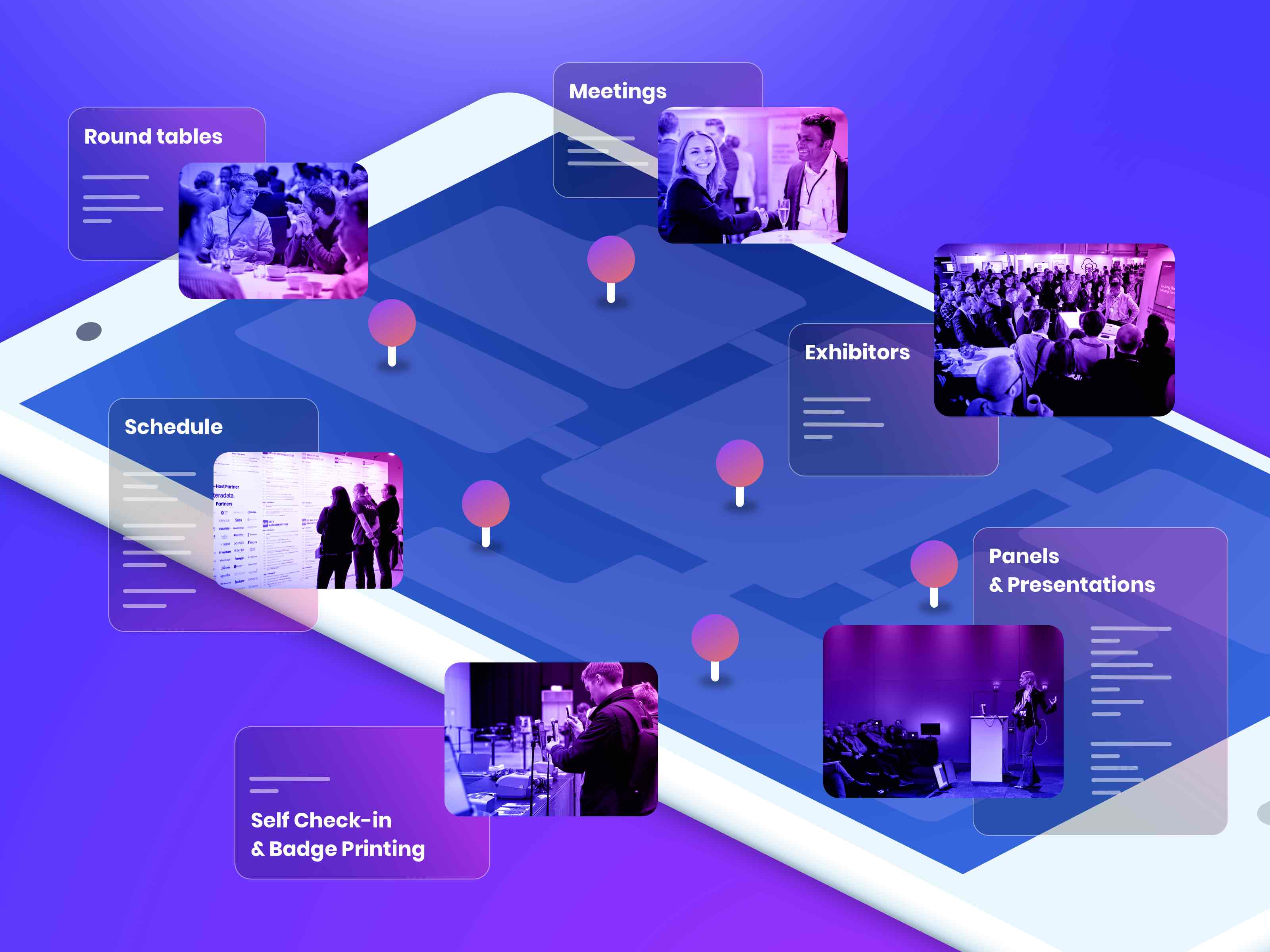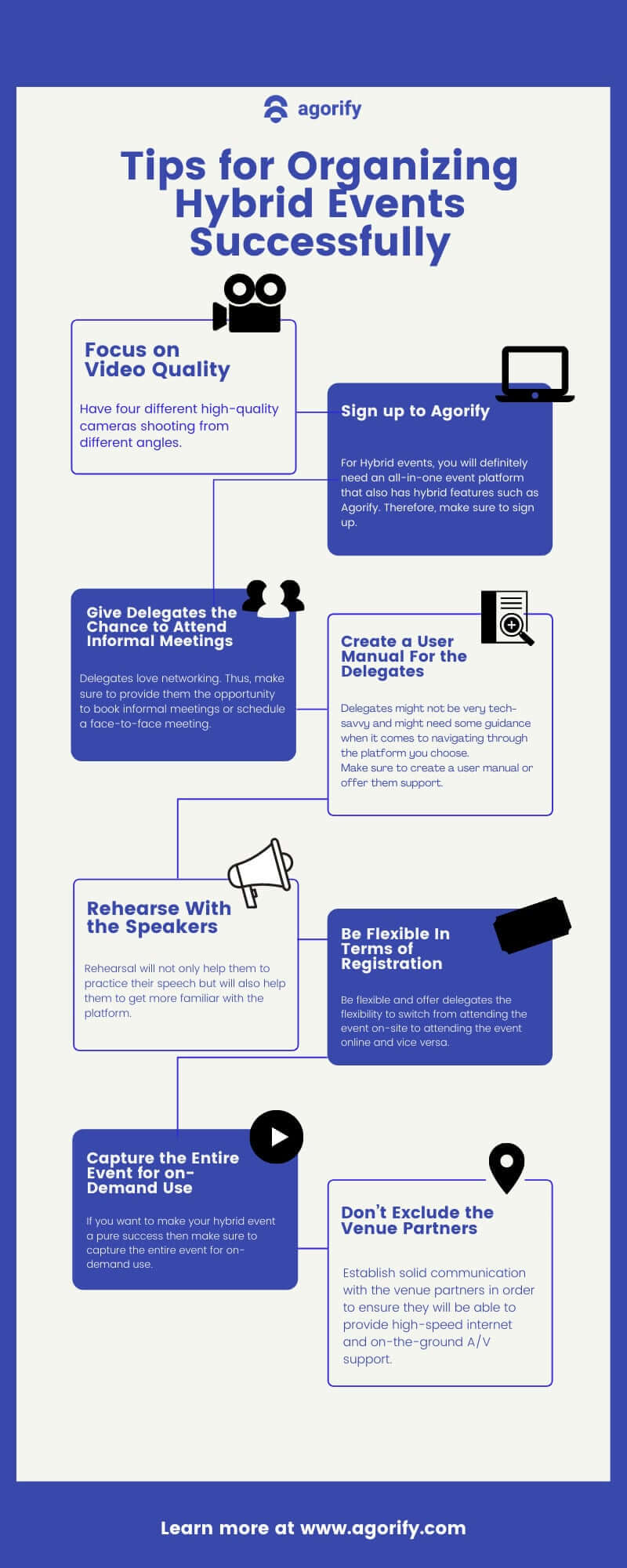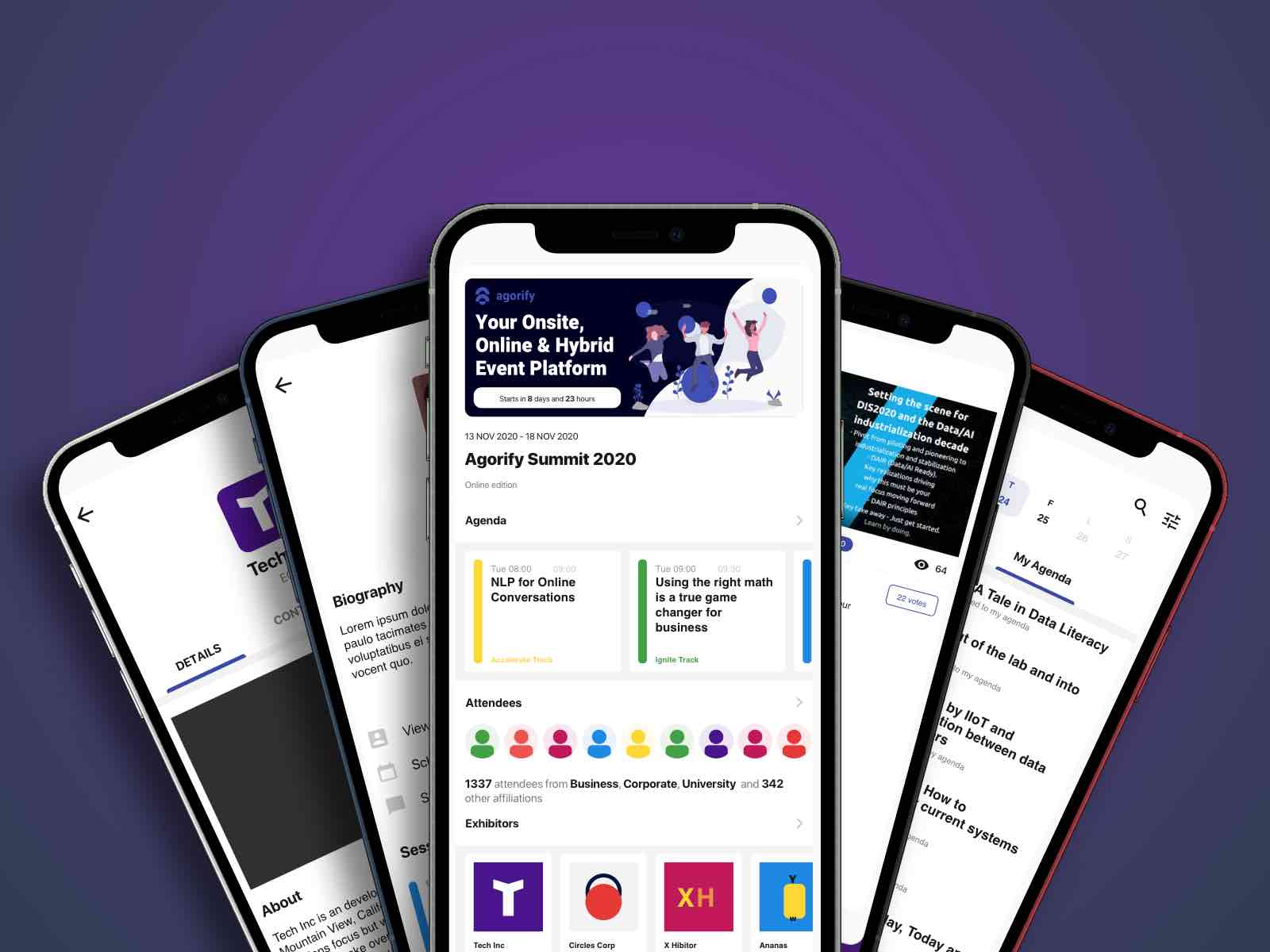Tips10 Tips for Organizing Hybrid Events the Right Way
There is no doubt that COVID-19 has brought a whole spectrum of challenges that people previously couldn’t even imagine they would ever face. However, it is exactly those challenges that pushed many industries towards innovations they previously feared to embrace.

The event industry is indeed one of the industries that felt the magnitude of COVD-19’s consequences to the fullest. And perhaps, those consequences would have been even harder to bear if it wasn’t for the internet and all the advantages it has brought to the table.
All of sudden, event organizers were “forced” to turn their physical events into virtual ones or just fully give up on organizing events until the pandemic is over. Thus, it is easy to say that the COVID-19 has created a new division of event organizers - one that is eagerly waiting for the pandemic to end and another that kind of started liking virtual events a “little bit too much”.
On top of that, things are not at all different with delegates and exhibitors either, those two “divisions” are much present among them as well. In other words, what was previously a challenge for them, now is a norm they actually enjoy. And this is where hybrid events join the game.
What Is a Hybrid Event?
Considering that you are here reading this it’s not hard to guess that you like the concept of hybrid events or you are simply curious to know how you can organize a hybrid event successfully.
The easiest way to define a hybrid event is by saying that it is a physical event that also has an online audience. In other words, when organizing hybrid events one should incorporate event technology into the traditional event planning and management.
Nevertheless, there are two things that an event has to fulfill in order to be a hybrid: to have both, a face-to-face and online gathering between the speakers and the delegates. Good examples of hybrid events are Apple Special Events, the Webinar World, and the Yellow Conference.
Yet, although the definition is super simple, many event organizers believe that organizing a hybrid event is much more complex than it sounds like. However, don’t worry, we have you covered!
Keep reading to find out the best tips for organizing hybrid events. Let’s dive in!

Don't Ignore Video Quality When Organizing Hybrid Events

If you strive to make your hybrid event equally good for both physical and remote delegates then you definitely should pay attention to the images and the video quality. The best thing you can do as an event organizer is to invest in high-quality audio and video equipment.
This will allow remote delegates' experience as much as possible from the physical event regardless of their location.
Choose a Good All-in-One Hybrid Event Platform
You might have the most qualified cameramen, highest-quality cameras, and prominent speakers that people are super excited about, but if the platform where you broadcast your event is not good enough then everything might fall in the water. In fact, this is exactly why some event organizers stick to physical events only.
Another thing you should consider is finding a platform where you can broadcast your hybrid event is only one piece of the puzzle. Why? Because the platform might be the best in broadcasting an event, but if it doesn’t have all the necessary features for such an event then you are back at the beginning.
Remote delegates should be able to interact with the speakers and exhibitors, book face-to-face meetings, get divided into smaller groups for more targeted and in-depth discussions, etc. In other words, the event management platform you choose should be able to provide them the best user experience they can get in order to get the same feeling as if they were attending the event physically.
Besides, keep in mind that not all of the “all-in-one” event management platforms are really “all-in-one” and even if they are, they still might not be specializing in hybrid events.
Luckily, the True Hybrid feature on the Agorify platform offers all the features mentioned above and many more! Hence, if you are looking for an event management platform to host a hybrid event then Agorify’s True Hybrid is what you are looking for. To learn more about it,click here.
Give Delegates the Chance to Attend Informal Meetings

The reason why many people prefer to attend physical meetings over online ones is because of the networking they do during breaks. However, if you are planning a hybrid event then you definitely should make sure to provide all delegates equal opportunities, regardless of their location.
This is why digital delegates must be able to also book separate meetings with each other within the hybrid event platform or even schedule a physical meeting if they want. Another thing that you can do as an event organizer is to come up with relevant questions and ideas on which they could discuss during these informal meetings.
Create a User Manual For the Delegates
Keep in mind that for many delegates attending a hybrid event is something completely new. Moreover, although some of them might want to give hybrid events a shot, they still might not be tech-savvy.
So what is the solution? It is actually super easy. All you have to do as an event organizer is to create a user manual guide, video tutorials, or simply send them a link from guides pages of the hybrid event platform you will use.
In addition, you also should mention to them that you are always there to offer them full support in case they have some difficulties navigating through the platform as well. Although not many people might request such support, it is still a good idea to bring that up as it will show them that you truly care for them.
Rehearse With the Speakers
Hybrid events might not only be new for delegates, but also for speakers. This is why when organizing hybrid events it is super important to encourage speakers to rehearse using the platform of your choice.
Rehearsal will not only help them to practice their speech but will also help them to get more familiar with the platform, the virtual feel, and the producer team.
Of course, this can also be beneficial for you as an event organizer as that way you will know exactly what to expect from all of them.
In fact, you can even invite your sponsors to attend this rehearsal as well. This is is especially important if it's their first time sponsoring a hybrid event as that way they will also get a clear picture of how the event will look like. In case you are still in search of sponsors, check out this blog post by spacehuntr where you can find some great tips on that topic.
Be Flexible In Terms of Registration
There are many lessons that COVID-19 taught people, but one of the biggest lessons is that we shouldn’t take anything for granted. This means that you shouldn’t take your delegates’ choice of which way they will attend the event for granted either.
Be flexible and offer them the flexibility to switch from attending the event on-site to attending the event online and vice versa. In fact, this is particularly important because of the travel restrictions that are constantly changing nowadays.
Of course, it is understandable that you might want to have everything set up and know in advance how many people will attend your on-site event and how many will attend your online, right? So the solution for this is to set up a specific date until which they will be able to switch the way they will attend your hybrid event, for example, three days before the event.
Enable Communication Between the on-Site Delegates and the Remote Delegates

One of the major challenges of hybrid events isn’t really the communication between the speakers and the remote delegates, but the communication between the on-site and remote delegates.
However, there is a solution for this as well. All you have to do is just put a screen on the stage and ask them to interact with the speakers and the on-site delegates, ask relevant questions, and so on.
Another good idea is to ask on-site delegates to access the management platform through their smartphones in order to communicate with the remote delegates if they want. This is one more reason why you should choose the event management platform carefully. Check whether they have a mobile app that the delegates can download.
If you still haven’t chosen your hybrid all-in-one event management platform then again, make sure to check out Agorify that already has all those features.
Capture the Entire Event for on-Demand Use
The beauty of online events is that delegates could watch the event whenever they can, which is why many of them prefer online events in the first place. Unfortunately, not all event organizers offer them this option.
Thus, if you want to make your hybrid event a pure success then make sure to capture the entire event for on-demand use. What’s more, some delegates might even accept purchasing a ticket for your event because of this.
Don’t Exclude the Venue Partners
Many event organizers believe that the venue partners have nothing to do with the virtual part of their hybrid events, but this couldn’t be further from the truth. When organizing a hybrid event, you will still have to establish solid communication with the venue partners in order to ensure they will be able to provide high-speed internet and on-the-ground A/V support.
So when organizing a hybrid event, make sure to bring that up to your venue partners as well.
To Wrap Up
Hybrid events are, without a doubt, the future of the event industry. As a matter of fact, according to Markletic, for SMBs, on average, 56% of delegates attend the on-side event while 44% attend the virtual version of a hybrid event.
Thus, if you still haven’t decided whether to organize a hybrid event or not, this is your chance to make that decision and go hybrid before anyone else does.
Once again, if you are interested in organizing hybrid events and need a True Hybrid all-in-one event management platform then Agorify is the way to go. Click here to contact us and to learn more about our hybrid features.